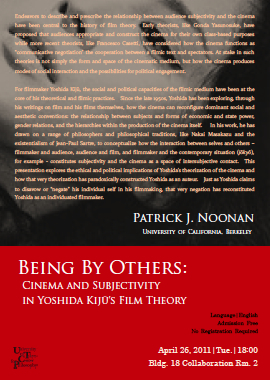
|
Title: | UTCP Lecture "Being By Others: Cinema and Subjectivity in Yoshida Kijū’s Film Theory"Finished |
||
|---|---|---|---|---|
| Date: | 18:00-19:30, Tuesday, April 26, 2011 |
Place: | Collaboration Room 2, 4th Floor, Building 18, University of Tokyo, Komaba Campus [Map] |
|
Speaker: Patrick J. Noonan (University of California, Berkeley)
"Being By Others: Cinema and Subjectivity in Yoshida Kijū’s Film Theory"
Date: 18:00-19:30, Tuesday, April 26th, 2011
Place: Bldg. 18 Collaboration Room 2, Komaba Campus, Univ. Tokyo.
Language: English | Admission Free | No registration required
Organized by UTCP
Abstract
Endeavors to describe and prescribe the relationship between audience subjectivity and the cinema have been central to the history of film theory. Early theorists, like Gonda Yasunosuke, have proposed that audiences appropriate and construct the cinema for their own class-based purposes while more recent theorists, like Francesco Casetti, have considered how the cinema functions as “communicative negotiation” the cooperation between a filmic text and spectators. At stake in such theories is not simply the form and space of the cinematic medium, but how the cinema produces modes of social interaction and the possibilities for political engagement.
For filmmaker Yoshida Kijū, the social and political capacities of the filmic medium have been at the core of his theoretical and filmic practices. Since the late 1950s, Yoshida has been exploring, through his writings on film and his films themselves, how the cinema can reconfigure dominant social and aesthetic conventions: the relationship between subjects and forms of economic and state power, gender relations, and the hierarchies within the production of the cinema itself. In his work, he has drawn on a range of philosophers and philosophical traditions, like Nakai Masakazu and the existentialism of Jean-Paul Sartre, to conceptualize how the interaction between selves and others — filmmaker and audience, audience and film, and filmmaker and the contemporary situation [jōkyō], for example — constitutes subjectivity and the cinema as a space of intersubjective contact. This presentation explores the ethical and political implications of Yoshida’s theorization of the cinema and how that very theorization has paradoxically constructed Yoshida as an auteur. Just as Yoshida claims to disavow or “negate” his individual self in his filmmaking, that very negation has reconstituted Yoshida as an individuated filmmaker.
Speaker
Patrick J. Noonan is a Ph.D. candidate in the Department of East Asian Languages and Cultures with a Designated Emphasis in Film Studies at the University of California, Berkeley. He is working on a dissertation about film and literature in 1960s Japan. He has published on Yoshida Kiju and is co-translator of Camera Obtrusa: The Action Documentaries of Hara Kazuo.







